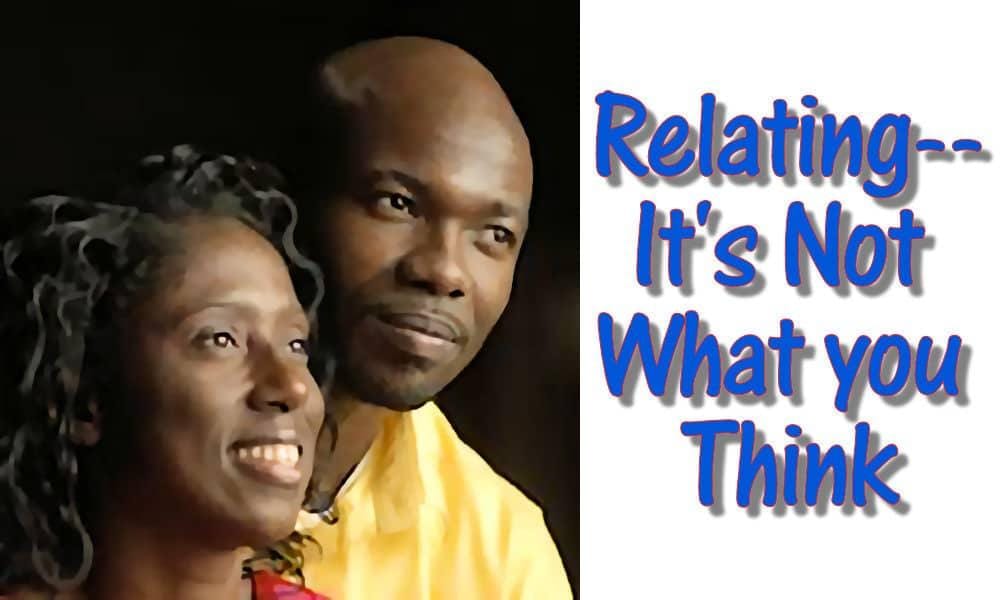Relating is a task that moves in one direction — from you to your partner. It is meant to be an exercise in self-awareness.

If your present relationship needs work, well…
check out
The. Best. Relationship. Ever.
It’s my relationships book… you’ll find all the help you need!
Purchase all formats at Amazon
Purchase digital versions (Apple, Nook, Kobo, etc.) from this page

First of all, most of what I’m going to suggest has a “language component” to it.
IMHO, one of the few things that Freud was right about was what are called Freudian Slips. That’s when words pop out of your mouth that say what you really are thinking. We all do this, sometimes out of habit.
But speaking of habits, if you refuse to correct yourself when you misspeak yourself, you actually make it almost impossible to shift the habit.
And relating poorly, believe me, is nothing more than a bad habit. And language is that powerful.
Let’s, then, start with your relationship.

You don’t have one. None of you do. Me either.
What I mean is this: no matter how hard you try, you can’t take a relationship into a counselling office (or anywhere else for that matter.)
What you can take in the room is you and your partner.
But then, what we have is a therapist, you, and your partner. Still no relationship.
The therapist says, “I’d like each of you to tell me what brings you here.”
As you and your partner speak (or cut each other off, or finger-point, or sigh and roll your eyes dramatically…), you begin to relate.
The therapist cannot see a relationship, but (s)he can see how you relate with each other.
Talking about “the relationship” is a way to avoid talking about what is important
On the other hand, if you say, “Here is my perspective on how I relate with my partner, and my take on what isn’t working for me,” there’s hope.
The problem with nouns like relationship, husband, wife, family, etc. is that we toss them out there as if they mean something.
“Everyone knows that a good [fill in the blank] is [fill in the blank], and that’s not what we have, so…”
Except that there are as many definitions of, say, relationship, as there are people.
And “everyone knows” means, “everyone would agree with me that my partner is wrong.”
Second, the only thing you can ever talk about is yourself
The key word, when communicating, is “I.” And yet, it tends to be the least used word. As we said last week, the norm is to use “you,” and to blame.
You can read about the Communication Model in a couple of my books, but key to it is the use of “I.” The only authentic use of “you” is when I describe what I sense, as in, “Your eyes are squinty, and you are looking down.” Or, “Your voice seems loud.” That sensory data is pretty hard to dispute, assuming you are stating what you see/hear.
From that point on in the dialogue, all you can talk about is what you are doing with the data. “Your eyes are squinty, and you are looking down, and I interpret that to mean that you are mad at me.”
That is worlds away from, “You are mad at me,” or “You always get mad at me.” The bottom line of great relating is giving up thinking you know anything for sure about your partner–all you know is the story you are telling yourself.
So, again and again, you state your guess, and ask your partner what’s up.
Third, if you think your job is to fix or change your partner, please go get a divorce
Your job is to work on yourself, and to share your perspectives with your partner, and vice versa. I mean, really, who appointed you the “fixer” of another?

She: I just want him to go with me to see my parents.
He: I’ve made plans for the weekend, so not this time.
She: Stop being unreasonable… and besides, you never want to do what I want to do…
He: I went to your parents’ place 2 weeks back, and I’ve made plans for this weekend, so not this time.
She: (sniffle, sob — to me) See! He’s never going to change!
I encouraged them to talk a bit more, and he did a good job of sticking to a simple statement, as she pulled out all the stops.
I finally stopped things, and said to her, “So, first, are you saying that you want him to do what you want him to, every time?”
She: Yes! That’s what marriage is all about! Doing what your partner wants!
Me: And just for my information, do you go to visit his parents regularly?
She: (Aghast) Of course not! His parents are idiots, and they don’t like me, so I never go.
Me: Do you see a contradiction?
She: )(puzzled… then) No! My request is reasonable, and besides I have the right not to see his parents.
And on… and on…
And no, she never saw what was happening, because she had firmly convinced herself that he was the problem, and she was the solution.
Fourth, you need to be committed
Actually, I wish she could have been, but I digress.
We suggest 30 minutes a day for communicating, using the Model. Minimum. And then, out come the excuses. No time, (s)he won’t, it won’t work.
And candidly, I agree. It won’t work if you don’t do it, and it won’t work if you refuse to give up blaming and fixing.
So, what’s left? Well, someone to share with, cry with, work things through with. But only possible if I get over myself and use the 30 minutes as an opportunity to work on myself.
Because that’s what relating is for.
I’m privileged to have Darbella as a witness to my life and my learnings, and I’m privileged to witness her. Not once in 43 years have we tried to fix the other, ’cause, hey! We’re not broken!
We listen, we offer perspectives and suggestions if asked (that part is still hard for me, as I want to jump right in there with my insights. Dar is good at telling me to back off.)
Read The. Best. Relationship. Ever., or go find a therapist who can teach you a Communication Model. Learn to work on yourself, and to share what you are learning, and who you are, with your nearest and dearest.

If your present relationship needs work, well…
check out
The. Best. Relationship. Ever.
It’s my relationships book… you’ll find all the help you need!
Purchase all formats at Amazon
Purchase digital versions (Apple, Nook, Kobo, etc.) from this page
You don’t have to do this alone, but you do have to commit to doing it.





